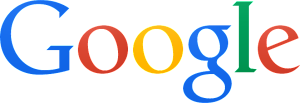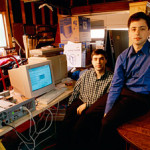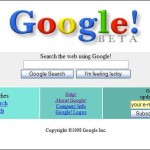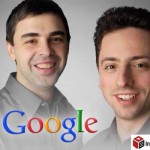www.Google.com
| Original Offering |
Significantly better search engine. |
| Value Proposed | World’s information more accessible. |
| Resources that Offering Makes More Of | i. Internet. ii. Information stored on Internet. iii. Founders’ Computer Science knowledge: Discovery about dynamics of Internet links. General insights about human-computer interaction. |
| Societal Progress | “Profit” — benefit to U.S. economy. “People” — more use of information for progress throughout global society. |
1. Agent Path to Hypotheses
Larry Page’s research for his doctoral dissertation in Computer Science led to the actionable insight that became Google:
- In 1995: “I started collecting the links on the Web, because my advisor and I decided that would be a good thing to do.”
- At the time of attempting to download the entire World Wide Web (catalyzed by a vivid dream): “(I) had no thought of building a search engine. It wasn’t even on the radar.”
- The exploration included looking at things like: “Which (Web) pages link to which pages?” For example: “Who links to the Stanford University web page?”
2. Hypothesis of “What Could Be” As New Value
 Page’s exploration and experimentation produced an actionable insight:
Page’s exploration and experimentation produced an actionable insight:
- Upon observing an association between number of links and ranking of links: “We should use it for search.” “We should be able to make a better search engine.”
- [Note: “Better” search engine meant better than “at least five prominent search engines” already in existence.]
The hypothesis offered the possibility of more fruitful use of the Internet. (In turn, it could mean more fruitful use of the world’s information.)
Acting on the hypothesis could mean more fruitful use of Page’s computer science knowledge and imagination, given his self-described motivation to pursue new knowledge and/or technical capability for the benefit of practical applications.
Sample Knowledge Connected in “What Could Be” Hypothesis:
Domain/Industry Knowledge
- High-level computer science knowledge
- Included deep understanding of World Wide Web and computer science in general.
- Page grew up in a household with both parents immersed in early academic computer science work. His own hands-on engagement preceded graduate-level work by many years.
Human/Social Knowledge
- As a college student, Page worked directly with pioneers of “Human-Computer-Interaction.” He had an early and continuing conviction in the value of “usability.”
- For example, when Page and co-founder Sergey Brin “compared notes” with other search engine developers, the others held that customers needed to become better at search terms. Page’s lens of usability led him to see this differently.
- As fellow usability devotee, Steve Jobs, put it: “We’re the ones who are stupid if customers can’t use our products.”
3. “How” the Hypothesized New Value Could Become an Offering
Some Key Elements of Business Model:
1. Core Value Proposition — Developing The Product
Instead of completing a dissertation, Page, accompanied by fellow Stanford Ph.D. Computer Science student, Sergey Brin, began to focus on the “how” of developing their vision for a superior search engine.
In 1996, still at Stanford:
- Page and Brin developed algorithms to “process the link structure of the Web,” leading eventually to a patent for a page rank algorithm.
- They named their first search engine, “Back Rub,” running it on Stanford University servers, making it accessible to all at Stanford, and “eventually taking up too much bandwidth.”
- “Maxing out three credit cards … they bought three servers off of the back of a truck.”
- In 1997, they registered the domain Google.com — “a play on the word “googol,” a mathematical term for the number represented by the numeral 1 followed by 100 zeros — reflecting (their) mission to organize a seemingly infinite amount of information on the web.”
- In 1998, they received a check for $100,000, moved to a household garage, and began garnering major endorsements (e.g., from PC Magazine). This was followed less than a year later by initial venture capital funding of ~$25 million.
2. Experimenting toward Revenue Source —
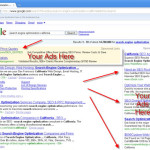 Although Google’s first focus was technical performance, the young company experimented continually in early years with varying types of revenue sources. It wasn’t until they tried “Ad Words,” in 2000, and then modified it into something novel and highly effective, by 2002/03, that Google found a primary revenue source that met their high standards.
Although Google’s first focus was technical performance, the young company experimented continually in early years with varying types of revenue sources. It wasn’t until they tried “Ad Words,” in 2000, and then modified it into something novel and highly effective, by 2002/03, that Google found a primary revenue source that met their high standards.
- When Ad Words began, it featured mechanisms already in use. For example, it allowed businesses to advertise to people searching for things on Google.com and to bid for top positions in search results.
- Bids were based on the amount that the business would pay Google per searcher “click” on the ad.
- Even as Ad Words was “working” for them, Google experimented with the existing mechanisms, which led to incorporating “relevance”: If an ad from a lower-positioned bid got more clicks than ads in higher positions, that ad’s “relevance” to searchers earned the advertiser a higher position in search results.
- In the higher position, more relevance to searchers also tended to generate more revenue for Google. There was an advantage for all parties — the searcher customers, the Ad Words advertiser, and Google.
3. Customer Relationships —
- “Since the beginning, we’ve focused on providing the best user experience possible.”
- “Whether we’re designing a new Internet browser or a new tweak to the look of the home page, we take great care to ensure that they will ultimately serve you, rather than our own internal goal or bottom line.”
- “Our home page interface is clear and simple ad pages load instantly …(A)dvertising is not only clearly marked as such, it offers relevant content and is not distracting.”
- “And when we build new tools and applications, we believe they should work so well you don’t have to consider how they might have been designed differently.”
Sample Knowledge Connected in “How” Hypotheses:
Domain/Industry Knowledge
- Again, high-level computer science knowledge, from both founders.
- Brin brought special interest in the specialized knowledge of data mining.
Customer Knowledge as Human/Social Knowledge
- Page and Brin identified as the first core principle guiding their actions: “Focus on the user and all else will follow.”
- That customer focus seemed fundamental to their Ad Words “relevance” development. They noticed that if lower-positioned ads got more clicks, it indicated that those ads held more “value” to the searcher customers.
- This user focus may have been based as much on intuition — or even empathy — as on particular knowledge. In one way or another, usability and customer perspective has been fundamental to Page and Brin’s approach to Computer Science and to technology in general.
- The name, “Google,” and its colorful logo (initially with an exclamation mark) illustrates the offering’s integration of high-level knowledge (a mathematical term) with fun and usability for the customer.
4. Why Google’s Agents Would Do This
Although Google’s extraordinary success might make the answer to “why do this” seem obvious, there were plenty of early sacrifices that would make the answer less obvious. For one thing, both Page and Brin abandoned their funded and prestigious doctoral work in order to focus on developing Google as a business, which included “max(ing) out three credit cards.”
- “Our mission is to organize the world’s information and make it universally accessible and useful. How can that not get you excited?”
- “But we almost didn’t start Google, because my cofounder Sergey and I were too worried about dropping out of our PhD program.”
- “You are probably on the right track if you feel like a sidewalk worm during a rainstorm!”
- “That is about how we felt after we maxed out three credit cards buying hard disks off the back of a truck.” …
- “What is the one-sentence summary of how you change the world? Always work hard on something uncomfortably exciting!”
In the years before making the decision to start Google, Page actually spoke to his “why” — his driving motivators — at the time of his hypothesis regarding a way to use links toward better search engine performance:
- “I figured I could get a dissertation and do something perhaps fun and perhaps practical at the same time, which is really what motivates me.”
- It’s the integration — the pursuit of new knowledge and/or technical capability for the benefit of practical applications — that has “really motivated” him. The combination fits with innovation’s fundamental “change by way of value.”
